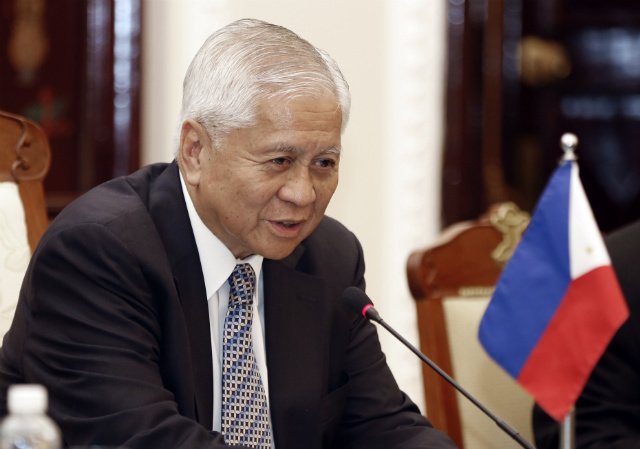Positioning itself as a regional 'leader,' the Philippines bares the details of the 'triple action plan' it will propose to ASEAN

BOOSTING TIES. Philippine Foreign Secretary Albert del Rosario talks to Vietnamese Foreign Minister Pham Binh Minh (not in photo) during a meeting at the Government Guest House in
The Philippines' proposed moratorium on tension in the South China Sea should cover “specific” activities, and serve as a “more concrete definition” of a 2002 statement to maintain peace in the disputed waters.
The Philippines' Department of Foreign Affairs (DFA) explained this on Friday, August 1, in its first formal statement about the “triple action plan (TAP)” it will propose in the Association of Southeast Asian Nations (ASEAN) meetings in Myanmar this month.
The DFA said: “As an immediate approach, the TAP calls for a moratorium on specific activities that escalate tension in the South China Sea. This approach brings to fore the need for a more concrete definition of paragraph 5 of the ASEAN-China Declaration of Conduct on the South China Sea.”
Paragraph 5 of the DOC, a non-binding document signed in 2002, already says claimant states should “undertake to exercise self-restraint in the conduct of activities that would complicate or escalate disputes and affect peace and stability.”
The Philippines, however, saw the need to define this paragraph more concretely as a way “to press the gas pedal” in resolving the sea disputes. It wants “to be a leader to speed things up,” DFA spokesman Charles Jose told reporters in June. (READ: Philippines to press 'gas pedal' vs sea tensions)
“The Philippines hopes that the claimant states, other ASEAN countries, and the ASEAN dialogue partners will favorably consider this proposal as it is comprehensive, constructive, and brings together various initiatives that the Philippines and other countries have been advocating on the issue of the South China Sea for the past years,” the DFA said Friday.
Short-term to long-term
In its statement, the Philippines defined the TAP “as a concrete framework to address the escalating tensions in the South China Sea.”
It first announced this proposal, though informally, in late June “as tensions in the waters off Vietnam heightened due to emplacement of the Chinese Oil Rig HD981.” (READ: PH eyes 'moratorium' on South China Sea tensions and Q and A: 'Brave, patriotic' Vietnam challenges China)
The TAP involves immediate, intermediate, and final approaches to resolve South China disputes.
The immediate approach is the moratorium – a proposal that China has slammed because the Philippines, in its view, is the one raising tensions in the disputed waters. (READ: China turns tables on PH over 'moratorium' on tensions)
The intermediate approach is to highlight “the need and call for the full and effective implementation of the DOC and the expeditious conclusion of the Code of Conduct (COC),” a binding document to replace the DOC.
Del Rosario earlier said he doubts if China is willing to craft this COC because of the Asian giant's “expansion agenda.”
The final approach is to underscore “the need for a settlement mechanism to bring the disputes to a final and enduring resolution anchored on international law.”
The DFA said, “The Philippines is pursuing such a resolution through arbitration and believes that the Arbitration award will clarify the maritime entitlements for all parties, which will be the basis for the settlement of maritime disputes.”
The Philippines sees a ruling on this historic case by January 2016, said its lead counsel in the arbitration, Washington-based Paul Reichler.
http://www.rappler.com/nation/65021-philippines-asean-triple-action-plan-moratorium

No comments:
Post a Comment
Note: Only a member of this blog may post a comment.